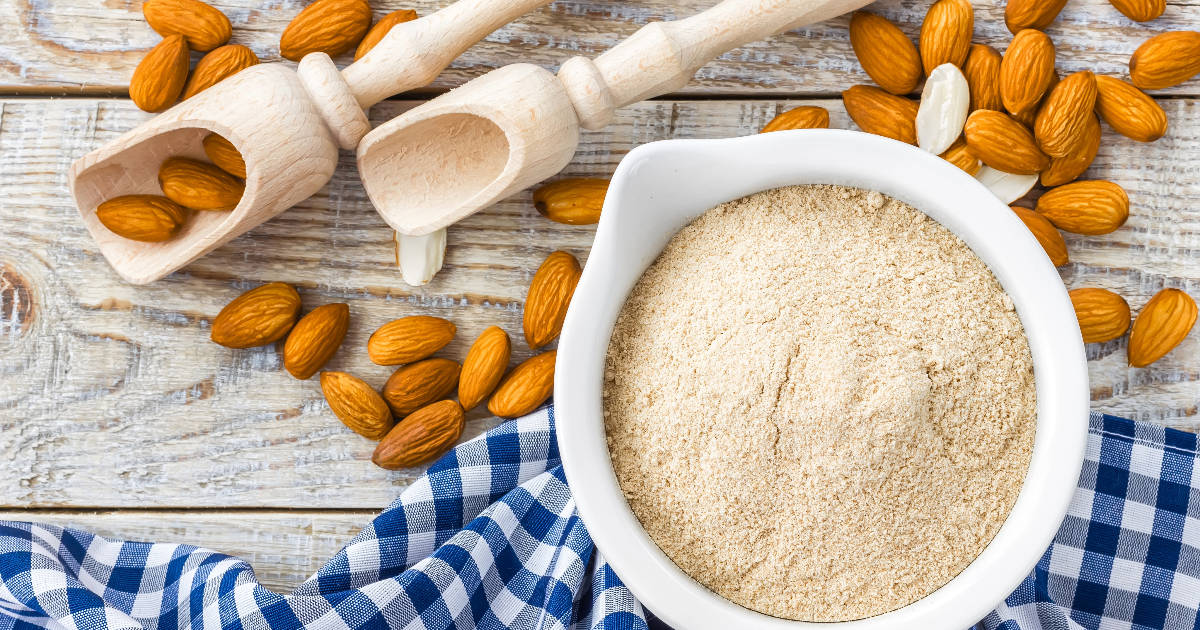Almond flour has become an increasingly popular ingredient, especially among those following low-carb and keto diets. But is almond flour actually keto-friendly?

As you adopt a keto lifestyle, you have to make some big changes to the foods you eat. Cutting way back on sugar and removing high-carb foods like bread, pasta, and baked goods can be challenging. Fortunately, with ingredients like almond flour, you can still enjoy many of your favorite carb-heavy dishes in keto-friendly versions.
Read on to learn what exactly almond flour is, its nutritional profile, why it’s so popular for low-carb baking, how to use it, and some delicious keto recipes made with almond flour.
What Is Almond Flour?
Almond flour is simply ground almonds. To make almond flour, blanched (skinless) almonds are finely ground into a flour consistency. However, it will never achieve the same ultra-fine powder texture as regular white flour.
While not exactly the same, almond flour can be used in many of the same ways as regular flour. Its natural nutty sweetness allows it to be substituted for flour in most recipes.
Key Takeaway: Almond flour is made from finely ground blanched almonds and can be used similarly to regular flour for baking.
However, there are some key differences to keep in mind when using almond flour:
- Lacks gluten - Almond flour has no gluten, so it can't replicate the elastic texture of dough made with regular wheat flour. Binding agents like eggs are often needed.
- Absorbs moisture - Almond flour tends to absorb more moisture than wheat flour. Adjustments to the wet ingredients may be needed.
- Nutty flavor - Obviously, almond flour will impart a nutty almond taste to foods made with it. This flavor is usually pleasant in sweets but can be overpowering in savory dishes.
Is Almond Flour Low Carb and Keto-Friendly?
One of the biggest reasons for almond flour's popularity is its low carbohydrate content. Let's compare the nutrition facts of almond flour and wheat flour:
| Nutrition Fact | Almond Flour (2 tbsp) | All-Purpose Wheat Flour (2 tbsp) |
|---|---|---|
| Net Carbs | 2 grams | 14 grams |
| Fiber | 2 grams | 0.5 grams |
| Fat | 14 grams | 0.5 grams |
| Protein | 6 grams | 2 grams |
| Calories | 160 | 60 |
With only 2 net grams of carbs per serving, it's easy to see why almond flour is so popular for low-carb and keto diets.
To stay in ketosis, keto dieters need to restrict net carbs to 20-50 grams per day. Used in moderation, almond flour can fit easily into this limit.
In fact, with its high fat and protein content, almond flour provides some of the key macronutrients for the ketogenic diet.
Key Takeaway: Almond flour contains only 2 net grams of carbs per serving, making it keto-friendly and low-carb.
So in summary, yes - almond flour is very keto-friendly! It fits perfectly into a low-carb, high-fat ketogenic diet when used properly.
Why Is Almond Flour Such a Popular Keto Ingredient?
There are several reasons why almond flour has become so widely used and loved by the keto community:
1. Versatile substitute for wheat flour
In most recipes, almond flour can be substituted 1:1 for wheat flour, allowing you to make keto versions of bread, cookies, cakes, muffins, and more. The texture and flavor will be a bit different, but still delicious.
2. Naturally gluten-free
Almond flour has no gluten, making it perfect for anyone avoiding gluten. Plus, it avoids the digestive issues sometimes caused by wheat.
3. Low in net carbs
With 2 net grams of carbs per serving, almond flour won't knock you out of ketosis when used properly.
4. High in healthy fats
The high-fat content provides energy and satisfies hunger, which helps with ketosis.
5. Packed with nutrients
Almond flour provides vitamin E, magnesium, calcium, iron, and other beneficial nutrients.
6. Adds flavor
The nutty almond flavor of almond flour works well in both sweet and savory dishes.
Considering all these benefits, it’s no wonder almond flour is a staple keto-baking ingredient. While it may not be part of a true paleo diet, it can help satisfy cravings for baked goods on keto.
How to Use Almond Flour for Keto
If you're new to baking with almond flour, follow these tips for best results:
- Use blanched superfine almond flour for baking. Avoid almond meals with skins.
- Don't swap almond flour 1:1 in all recipes. Some adjustment is often needed.
- Don't pack flour into cups. Use a spoon to gently scoop and level off.
- Consider adding binding agents like eggs or xanthan gum to replace gluten.
- Reduce other dry ingredients slightly to account for extra moisture absorption.
- Store almond flour in the refrigerator or freezer to prevent rancidity.
- Expect a slightly dense, grainy texture. Almond flour dishes won't be quite as airy.
- Adjust flavor by adding extracts like vanilla or almond.
- Toast the flour for a fuller nutty flavor (especially with savory dishes).
With a little practice, you'll be able to use almond flour to make keto versions of all your favorite baked goods.
Keto Recipes with Almond Flour
Here are some top-rated keto recipes featuring almond flour:
Savory Dishes

- Keto bread - This 90-second bread is a keto staple. The texture is surprisingly like wheat bread!
- Keto biscuits - These 5-ingredient almond flour biscuits are quick, easy, and perfect with any meal.
- Keto bagels - Who says you can't have bagels on keto? This recipe replicates the taste and chewiness of real bagels.
Sweets and Desserts

- Chocolate cake - This decadent chocolate cake will cure any cake cravings. Hard to believe it's low-carb!
- Sugar cookies - These keto sugar cookies are tender, buttery, and perfect for decorating for holidays.
- Vanilla cupcakes - You'd never guess these moist vanilla cupcakes with creamy frosting are keto and gluten-free!
Breakfast

- Pancakes - Fluffy low-carb pancakes made keto with almond flour and just 4 grams of net carbs.
- Waffles - These crispy nutty waffles are almost like eating dessert for breakfast on keto!
- Blueberry muffins - Bursting with juicy blueberries, this keto muffin recipe will be your new favorite.
With the help of almond flour, you can still enjoy pancakes, waffles, biscuits, bread, cupcakes, and more on the keto diet!
Is Almond Flour Healthy?
Overall, almond flour can be part of a healthy keto diet when used in moderation. Here are some of the main health benefits associated with almond flour:
- High in antioxidants - Almonds are rich in antioxidants like vitamin E that can help protect cells from damage by free radicals.
- May improve heart health - Almonds contain healthy fats, magnesium, and other nutrients that support heart health.
- Helps manage blood sugar - The fiber, protein, and fat in almonds help slow the absorption of sugar to minimize spikes and crashes.
- Supports gut health - The fiber acts as a prebiotic to feed healthy gut bacteria.
- Aids weight loss - Protein and fiber promote fullness, which can prevent overeating and lead to weight loss.
However, there are also some potential downsides of overdoing it on almond flour:
- High in calories - Almond flour contains 160 calories per 2-tablespoon serving, so portion control is key.
- Possible weight gain - Eating too many almond flour treats could lead to excess calorie intake and weight gain over time.
- Constipation - Like other nuts, excess almond flour could lead to constipation in some people due to fiber content.
As long as intake is limited to keto-friendly serving sizes, almond flour can be part of a nutritious ketogenic diet. But you certainly don't want your entire diet to consist of almond-flour baked goods.
FAQ
Is almond flour low-carb?
Yes, almond flour is very low carb, with just 2 net grams of carbs per 2 tablespoon serving. This makes it perfect for keto baking.
What's the difference between almond flour and almond meal?
The almond meal contains almond skins and is more coarse and grainy. Almond flour is blanched and ground into a finer powder.
Does almond flour spike blood sugar?
Almond flour has a low glycemic index, so it only causes a gradual rise in blood sugar rather than a big spike.
Can almond flour go bad?
Yes, almond flour has a limited shelf life. Store it in the fridge or freezer to maximize freshness and prevent rancidity.
Is almond flour gluten-free?
Yes, almond flour is 100% gluten-free, making it a safe option for anyone with celiac disease or gluten intolerance.
Conclusion
Almond flour has become a staple in low-carb and keto baking because it provides a grain-free, gluten-free alternative to wheat flour. With only 2 net grams of carbs per serving, it fits perfectly into keto macro limits.
While almond flour treats should be enjoyed in moderation, they make it possible to still have keto versions of muffins, breads, cookies, waffles, and more. So if you have a craving for your pre-keto favorites, almond flour is to the rescue!
With the help of almond flour, you don't have to miss out on your favorite baked goods just because you've gone keto. You can use it to make delicious low-carb bread, desserts, and other treats that keep you satisfied.
Key Takeaway: Almond flour is keto-friendly, gluten-free, and allows you to make low-carb versions of muffins, cakes, breads, and more on the keto diet.

